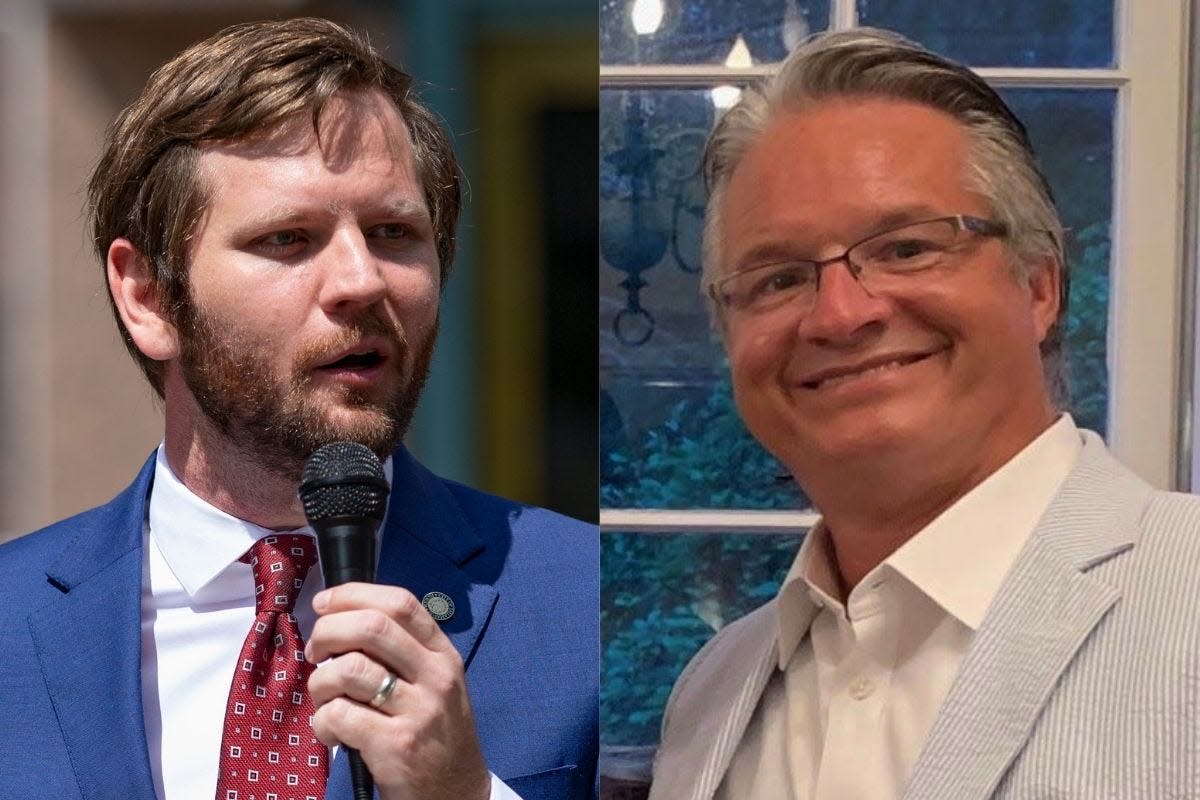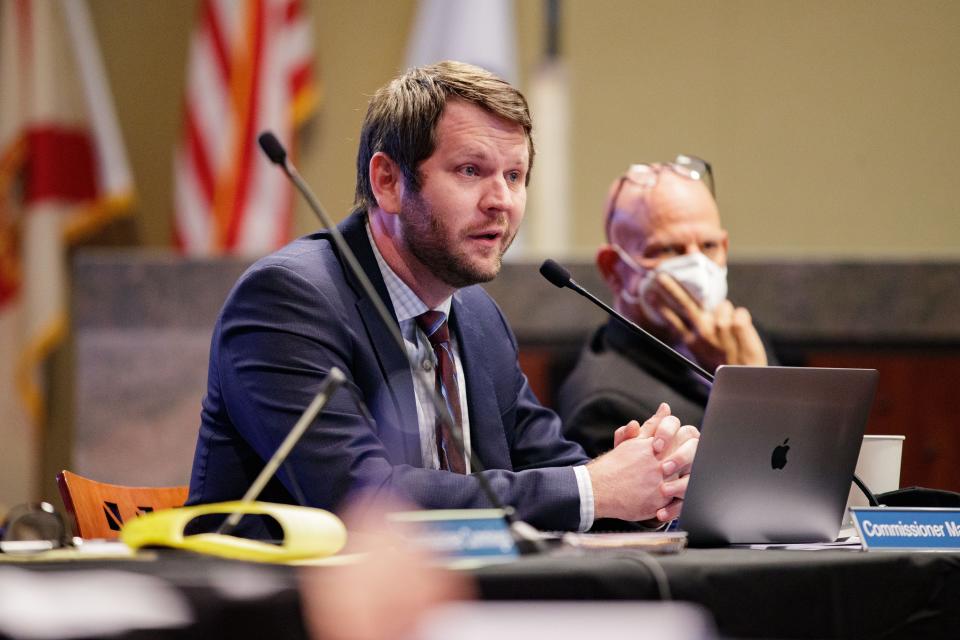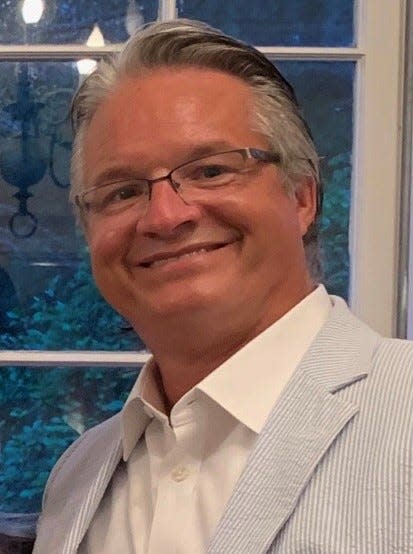City Commissioner Jeremy Matlow, David Bellamy debate for first time in NAACP forum

- Oops!Something went wrong.Please try again later.
Tallahassee City Commissioner Jeremy Matlow and his lone challenger, David Bellamy, debated one another for the first time Thursday, facing off on issues from development to homelessness.
The forum, held at the Lawrence-Gregory Community Center, was hosted by the NAACP, Tallahassee A.L.E.R.T. (African American Local Election Review Team), the Tallahassee Urban League and several other organizations and neighborhood groups.
Matlow, a restaurant owner, is seeking a second term. Bellamy, a surgeon, is making his first bid for public office. Here are excepts:
For Bellamy, what policy from the incumbent negatively impacted African Americans?
Bellamy: “It’s a little hard to pick out one he’s responsible for because — I feel bad saying this sitting next to him — there’s not much that he’s been able to achieve. You can’t say that there’s a policy that he’s responsible for. One thing that is hurting this community that I think could be focused on differently is affordable housing. He’s voted against affordable housing about four times. I know he says he wants it, I believe he probably does want it, but it seems like if he can’t have it the way he wants it, we’re not going to have it at all. We have got to fix our affordable housing problem. Just last month … there was a vote on a new development on the south side. Because it involved expanding the (urban services area) I believe, Jeremy voted against it. We have got to get more housing. We’re expected to get 30,000 more house needs in the next 15 to 20 years. That cannot be done without allowing more building. I understand that it takes cutting down trees, but if you put me in front of a pine tree and a poor child who has no home and no food, I will pick out the child every day and twice on Sunday. We have got to fight for affordable housing, even if it means compromising what you want.”
More: David Bellamy, surgeon and cop, will challenge Tallahassee City Commissioner Jeremy Matlow

Matlow: “There’s a lot to rebut there because frankly so much of it was not true. I’ve never opposed an affordable housing project. I’ve been a champion for affordable housing. I was the person who said when Blueprint destroys housing like they did building FAMU Way – almost 27 low income units that will never be that affordable again, I was the one who said Blueprint has the responsibility to replace those units one by one. But I will ask my opponent … he said that we need to be able to work together. I 100% agree with that. I’ve seen hundreds of people show up in public comment opposing the Doak Campbell Stadium. Nobody wanted to work with them. Nobody even wanted to support a compromise to bring it down to $10 million. I’ve seen hundreds of people show up from Killearn concerned about the Northeast Gateway going to dump traffic in their neighborhoods. Nobody wanted to work with them. Nobody wanted to compromise on that road project. Time and time again, the public comes to our public meetings and speaks out and it falls on deaf ears. It’s the real-estate interests, it’s the developers, it’s the bankers, the people who are flooding money into my opponent’s campaigns.”
More: Is Blueprint's IMC under Florida's Sunshine Laws? Jeremy Matlow is suing to find out
What was your position on Doak Campbell Stadium funding?
Matlow: “Doak Campbell was the most egregious waste of taxpayer funds that we’ve seen in the last decade. With only a week’s notice, it was put on the agenda ... to give $20 million to really shore up luxury stadium seats and improvements. Yes some basic infrastructure, but the Boosters are putting in something like $100 million. We all know money’s fungible and it can move around. The bottom line is they could have funded this themselves. So now in the tax that’s going to be collected over the next 20 years, six or seven years of money has gone to Doak Campbell. That money was meant for economic development. That money was meant to help small and locally owned businesses.”
Bellamy: “I don’t think anybody in the city or the county for that matter that voted for Blueprint thought any money would ever to the FSU Boosters. I would have voted against that. But I think a better leader could have been able to accomplish a compromise or do away with it entirely. People ask me well what about FAMU. That’s different. FAMU was on the verge of being condemned. If we had lost FAMU football to Orlando my bet is it never would have come back. I agree the Boosters could have raised the money. But I think a good leader could have worked out a compromise with other leaders to get it down to $10 million or nothing. At least if you couldn’t get it down we should have demanded more in return.”
What steps can the city take to ensure lower income residents are not being displaced by development?
Bellamy: “If you make a neighborhood successful, if you make the city bring up the appearance of a neighborhood to the rest of the city, if you give the citizens money in their pocket, all of a sudden it’s harder to come in and displace those people. But you also need a commissioner who is consistent on saying when it’s not OK to move in and gentrify. When they … successfully took away the trailer park way out Adams Street, you saw Jeremy there protesting, you saw him donate money, he made sure everybody knew he donated money to them. But when Kostas’ place on Adams Street was bought by a developer who then gave businesses about a week later to move out, including an African-American church, Jeremy wasn’t there defending them. Maybe because the person doing it is his good friend and campaign supporter. If it’s bad when it’s people on South Adams Street, it’s bad when it’s your friend on Adams Street closer to town. You’ve got to be consistent.”

Matlow: “The poor are our neighbors. It’s all of us as one community. But when we talk about displacement, we need to lead by example. We have road projects funded by local government, Blueprint, tearing down low-income housing, displacing people at the tax dollar’s expense. Dozens and dozens and dozens of units. We need to put money directly back into those. But I can already tell Dr. Bellamy is a cheerleader for big developers. By the way, when we talk about new development, what’s being proposed in Welaunee isn’t affordable. They’re burying power lines, they’re building fancy sidewalks, they’re building fancy roads and they haven’t built a single house yet. Meanwhile, they’re flooding money into Dr. Bellamy’s campaign and he’s trying to convince us that he’s going to do something different. He’s going to be different than the status quo when he’s taking money from the same developers and real estate interests who have controlled our city for decades.”
What can the city do differently in sheltering homeless people?
Bellamy: “It turns out every homeless person costs society about $1,000 a day. I used to think that was a crazy amount. And I started doing the math in my head. The police have to respond to a lot of calls … that’s extra cost to the city. Paramedics and firemen have to respond to extra calls, that’s money to the county. If you have a business with homeless in front of it, it hurts your business. If you have a property with homeless in front of it it hurts the sale value. But also just the medical care. So the first step in homeless management is realizing not doing anything is not free. If you know you’re spending that much money, spend it in an organized fashion. I think that we should look at some sort of area that is built for homeless. They can camp if they want. They can live inside if they want. But a place where they can have a safe quality of life but they’re also not out on the street. It’s not acceptable to allow people to live in the woods in large groups of people when half of it is because of mental illness. That’s not being humane.”
Matlow: “What we’re not going to do is we’re not going to set up camps and continue to ask people to live outside. That’s failed all across the country. It was disastrous in St. Pete. Studies have shown that 98% of people have experienced homelessness would move indoors if you allow them. But what’s happening in Tallahassee, again, it’s wrong. The homeless have been under attack. But what we know from what works is when you put people in housing first, when you don’t worry about trying to get them a job first .... It works. We brought this up during COVID, I was a huge advocate for the amount of funding needed – it was something like $8 million initially up front to house every chronically homeless and veteran in our community. There was a lot of pushback from my colleagues on that issue. We did end up achieving approximately $6 million for homeless services but it’s not enough. We can’t continue to treat the homeless as they’re not our neighbors. They’re not a problem that needs to be solved. They’re people that live in our communities.
Contact Jeff Burlew at jburlew@tallahassee.com or follow @JeffBurlew on Twitter.
Never miss a story: Subscribe to the Tallahassee Democrat using the link at the top of the page.
This article originally appeared on Tallahassee Democrat: Tallahassee City Commissioner Jeremy Matlow, David Bellamy have first debate

